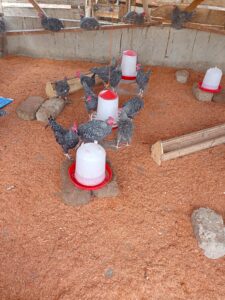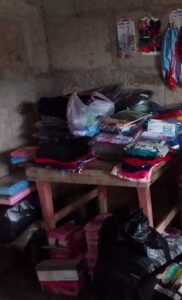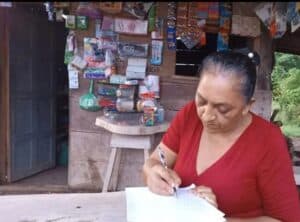Over 1000 Rural Nicaraguan Families are Receiving Clean Water

Plumber installing chlorine tablets
Maintaining active and continuous chlorination of water in drinking water systems is a unique and crucial need in Nicaragua and even more so in rural areas of River San Juan, with limited access due to the conditions of its roads and highways, since the region is around 300 km away from the capital Managua, there is also a lack of knowledge for those responsible of managing these chlorination systems and for the whole population in general and also lack of presence of both state and social entities that contribute to the support of programs to protect water for human consumption.
Even so, and with all these conditions and limitations in the Rio San Juan region, the Clean Water Program promoted by Self-Help International has been present since 2012 and has done a great job of awareness training, workshops, management guides for the aqueducts and personalized supervision so that the CAPS (Drinking Water and Sanitation Committee) can keep their water protection work active from their sources until it reaches the homes of those who receive it for personal use. Although the program has influenced many people to understand the importance of drinking treated water and the members in charge are making a good job of keeping these systems active, it is still necessary to influence the rest of the population since on many occasions these types of programs stop because the same people are the ones that downplays water care even though they know they are the direct beneficiaries.
This has been generating a need for the Clean Water program officer to has more presence in each community and with each committee since this situation was worse since the COVID-19 Pandemic and all its variants occurred. Since then, people, in addition to not having enough knowledge, have also been frightened to leave their homes, they chose not to continue attending meetings, training sessions or any other type of social events. Another cause of this instability is the Internal Regulation for the management of water systems here in Nicaragua that says: “That the CAPS directives must be in place for a period of 2 years” and then be replaced, which also causes instability because new members must be constantly trained and that weakens the stability and credibility of the CAPS organization.
There were almost twenty thousand nine hundred fifty-four (20,954) people who have been unattended with safe water in their homes since then. The CAPS were not chlorinating the water due to various factors, such as: organizational due to a lack of knowledge, willingness and responsibility in water quality management.
It was extremely necessary for the Program Officer Orlando Montiel to carry out several advisory visits and comprehensive technical monitoring on a constant basis to encourage the new CAPS managers and those who have already been in charge of the water systems, to reestablish the chlorination system again, remembering, sensitizing and raising awareness regarding the problems that raw water causes in the health and the immense importance of safe water in the living conditions of the people.
The situation has been changing and for the year 2022 it has been reestablish the chlorination of the water for 1,022 families, benefiting 5,797 people in 8 rural communities in the municipalities of San Carlos, San Miguelito, El Almendro, Muelle de los Bueyes and San Pedro de Lóvago, and in addition, 2 private companies also restored water chlorination in their facilities and offices, benefiting 524 people with safe water.
The Clean Water Program has implemented strategies to maintain constant advice and comprehensive technical monitoring to the CAPS, both in the permanence of territorial visits in situ, and the use of medias such as: WhatsApp, text messages , phone calls, etc., reminding the CAPS members the importance of keep their chlorine system actives.
Below are some comments from CAPS members on why they wanted to reactivate their water chlorination system in their communities.
- The community of Empalme Los Sanchez: The person in charge of this CAPS told us that his entourage and the entire population in general decided to reinstate the chlorination of the water because they were more concerned about the health of their children since with this action they also managed to activate the drinking water service on their community elementary school. Through the Self-Help International Program, the community received full training support, modified the chlorination system to a more compact and lightweight design, thus seeking to improve the efficiency of water chlorination.
- The community of Santa Maria: The CAPS president and his wife, along with the Clean Water Program officer convinced the people of that community to reactivate the chlorination system because, according to this couple, they and 54 more families needed to receive good quality water and treated to avoid diseases as they were before the whole pandemic thing occurred. So this couple is in charge of maintaining the chlorination of the water in the community, since not all the members of the board of directors are actively working. They dedicate their time to manage the acquisition of chlorine tablets and place them inside the chlorinator to make the water drinkable, acting as plumbers trained by Clean Water Program Officer.
- The community La Venada: The person in charge of this CAPS reactivated their chlorination system and they commented that they had stopped using the chlorine of the water because they did not have enough funds to purchase the chlorine tablets since their water distribution system was by gravity system and it didn’t allowed them to regulate the distribution of water, but with the support of the Clean Water Officer, they managed to change the distribution system to one through electric pumping. Now, they are using 5 chlorine tablets, which lasts for 2 months; using les money on it, because their water system is through electric pumping and the maximum hours they pump are 6 hours per day, therefore, the rest of the hours the tablet does not wear out and last more that before.
- The community Caracito: The responsible for this CAPS resumed chlorination in their community water system thanks to the continuous training of the Clean Water Program Officer, since they needed to train their new CAPS members, now, in addition to being trained, they also know that they have two possibilities of acquiring chlorine tablets in two different chlorine banks which are close to their community, which means that they don’t need to travel long distances to get them any more.
All this has been a gradual progress because there are many things still that need to be improved in each water committee and depending on their needs, the Clean Water program works to empower these members to continue their process of maintaining clean water and safety for them and their communities populations.




